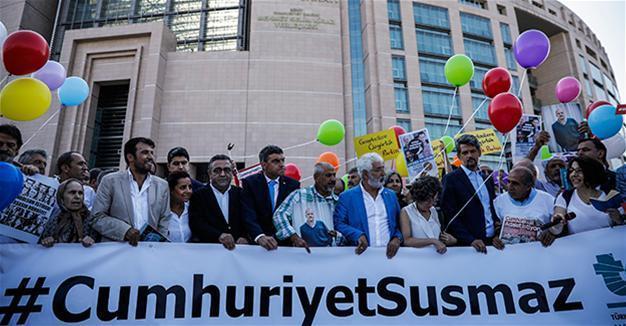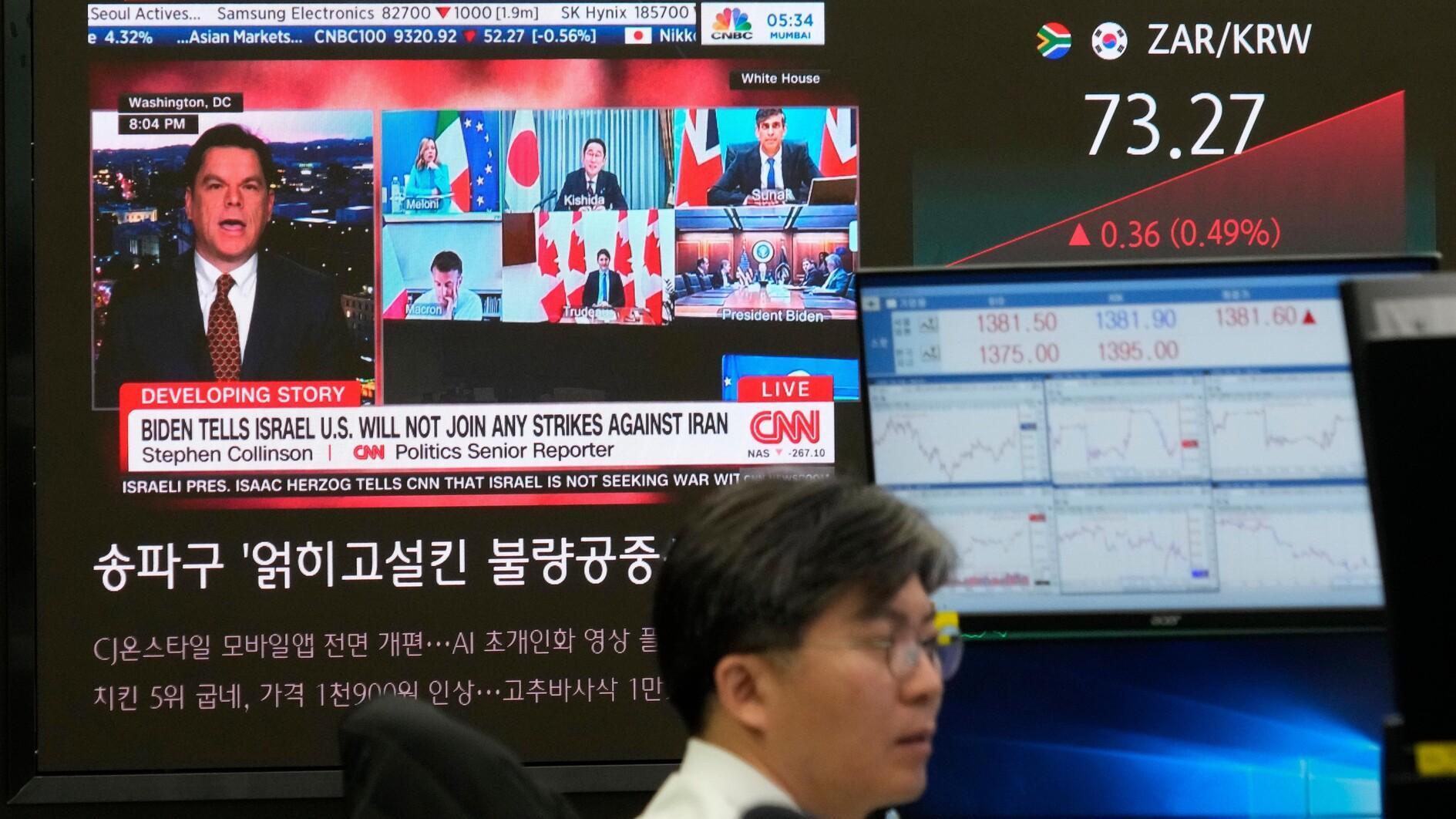Turkish daily Cumhuriyet journalists, executives go on trial in Istanbul
ISTANBUL
 Seventeen executives and journalists from daily Cumhuriyet, including the newspaper’s editor-in-chief Murat Sabuncu, Ahmet Şık, Kadri Gürsel and cartoonist Musa Kart, went for the first time on trial on July 24 with terror-related accusations in the 27th Heavy Penal Court in Istanbul.
Seventeen executives and journalists from daily Cumhuriyet, including the newspaper’s editor-in-chief Murat Sabuncu, Ahmet Şık, Kadri Gürsel and cartoonist Musa Kart, went for the first time on trial on July 24 with terror-related accusations in the 27th Heavy Penal Court in Istanbul.Eleven of the 17, including Gürsel, Sabuncu, Kart, and Şık, are held in custody, while the others had already been freed.
Since their arrests, Cumhuriyet has continued publishing the columns of the jailed journalists but with a blank white space instead of text.
A columnist and editorial consultant, Gürsel was the first to offer a defense, telling the court, “I am not here because I knowingly and willingly helped a terrorist organization, but because I am an independent, questioning and critical journalist.”
Gürsel said claims on his connection with the Fethullahist Terrorist Organization (FETÖ) were baseless. “The accusations are totally unsubstantial. That I have a contact with 92 users of ByLock [a smartphone app said to have been used by Gülen followers] and 21 who are under FETÖ investigation are unsubstantial.
Some 85 people sent me an SMS once and 17 people called me. As I have not answered those who sent me an SMS, the allegation that I contacted them cannot be accepted,” he told the court.
“It is a fool’s errand that a relationship can be established between my editorial consultancy and the change in the newspaper’s so-called publishing policy. How is possible that a person who started their work on Sept. 27, 2016 and stayed at their job for only 34 days, can change the publishing policy? That I have been a columnist for five months does not have an impact on changing the publishing policy,” he said.
The 324-page indictment alleges Cumhuriyet was effectively taken over by the network of the U.S.-based Islamic preacher Fethullah Gülen, believed to have been behind the failed July 15, 2016 coup attempt.
One of the other defendants, Murat Sabuncu demanded his plea to be adjourned to July 25, stating that some of his documents and newspaper reports had been confiscated. The court later accepted his request.
Other defendants include Ahmet Şık, who once wrote a book critical of Gülen’s movement.
The chairman of the newspaper, Akın Atalay, described the investigation into the newspaper as “a complete legal murder,” stating that the goal was either to silence the daily or take it over.
“This newspaper that is subject to this operation, that wants to be taken, whose resistance wants to be broken, that is desired to be brought to knees is not just an ordinary newspaper,” Atalay said in his defense to the court.
He said the daily had no relationship with organizations that infiltrated the state, vowing to continue its struggle to carry out journalism to the end.
Atalay said accusations that the editorial policy of the daily had been changed over the past three years did not reflect the truth, adding that it was “dubious” to use such an issue to frame an accusation based on the penal law.
Being tried in absentia is the paper’s former editor-in-chief Can Dündar, who was last year sentenced to five years and 10 months in jail over a front-page story accusing the government of sending weapons to Syria. He now lives in exile in Germany.
Earlier, lawmakers, journalists, rights activists, Cumhuriyet readers and many citizens gathered in front of the Çağlayan courthouse, where the journalists are appearing before the judge. Another group gathered in front of the Cumhuriyet building in the Şişli district and started to march toward the courthouse at around 9 a.m.
“Journalism is not a crime,” chanted several hundred people gathered outside the Istanbul court. Some flew dozens of multicolored balloons outside the courthouse, chanting, “Don’t be silenced! A free media is a right!”
“This case is about criminalizing journalism. It’s about punishing those who speak out. And if it works here today in this week, they will do it again, again, and again,” said Steven M. Ellis, director of communications of the International Press Institute, who arrived in Istanbul to observe the trial, along with other representatives of international media freedom advocacy groups.
Lawmakers from the opposition Republican People’s Party (CHP) and Peoples’ Democratic Party (HDP) also joined the hearings.
“According to the government, everyone in opposition is a terrorist, the only non-terrorists are themselves,” Filiz Kerestecioğlu, a member of parliament from the HDP, told reporters ahead of the trial.
Meanwhile, leader of the U.K.’s Labour Party, Jeremy Corbyn, shared a message in solidarity with the Cumhuriyet journalists. Talking to the newspaper Evrensel, Corbyn, a former journalist himself, said he will continue to support the struggle for freedom of thought in Turkey. He also appeared in a photo holding a white T-shirt that had Şık’s picture along with a statement saying, “Freedom to truth.”
CHP İzmir deputy Murat Bakan said on July 23, after visiting jailed CHP Istanbul MP Enis Berberoğlu in prison, that it had become so easy in Turkey to be charged over Gülen links in relation to the Cumhuriyet case. “This conspiracy case, whose indictment was prepared by a FETÖ-linked prosecutor, is an infamy to Turkish history,” he reportedly said.
The charges directed at the Cumhuriyet journalists include “membership of an armed terrorist organization” and “helping an armed terrorist organization while not being a member of it.”
Prosecutors are seeking sentences between 7.5 and 15 years in prison for Dündar, Sabuncu, Gürsel, Aydın Engin, Bülent Yener and Günseli Özaltay for “helping an armed terrorist organization while not being a member.”
Akın Atalay, Mehmet Orhan Erinç and Önder Çelik are charged with “helping an armed terrorist organization while not being a member” and “abusing trust,” with the prosecutor demanding between 11.5 and 43 years in jail for them.
Between 9.5 and 29 years in jail is demanded for Bülent Utku, Kart, Hakan Karasinir, Mustafa Kemal Güngör and Hikmet Aslan Çetinkaya on the same charges as those directed at Atalay, Erinç and Çelik.
In addition, the prosecutor sought between 7.5 and 15 years in prison for Şık for “helping and being a member of the outlawed Kurdistan Workers’ Party (PKK) and the outlawed Revolutionary People’s Liberation Party-Front (DHKP-C).”

















